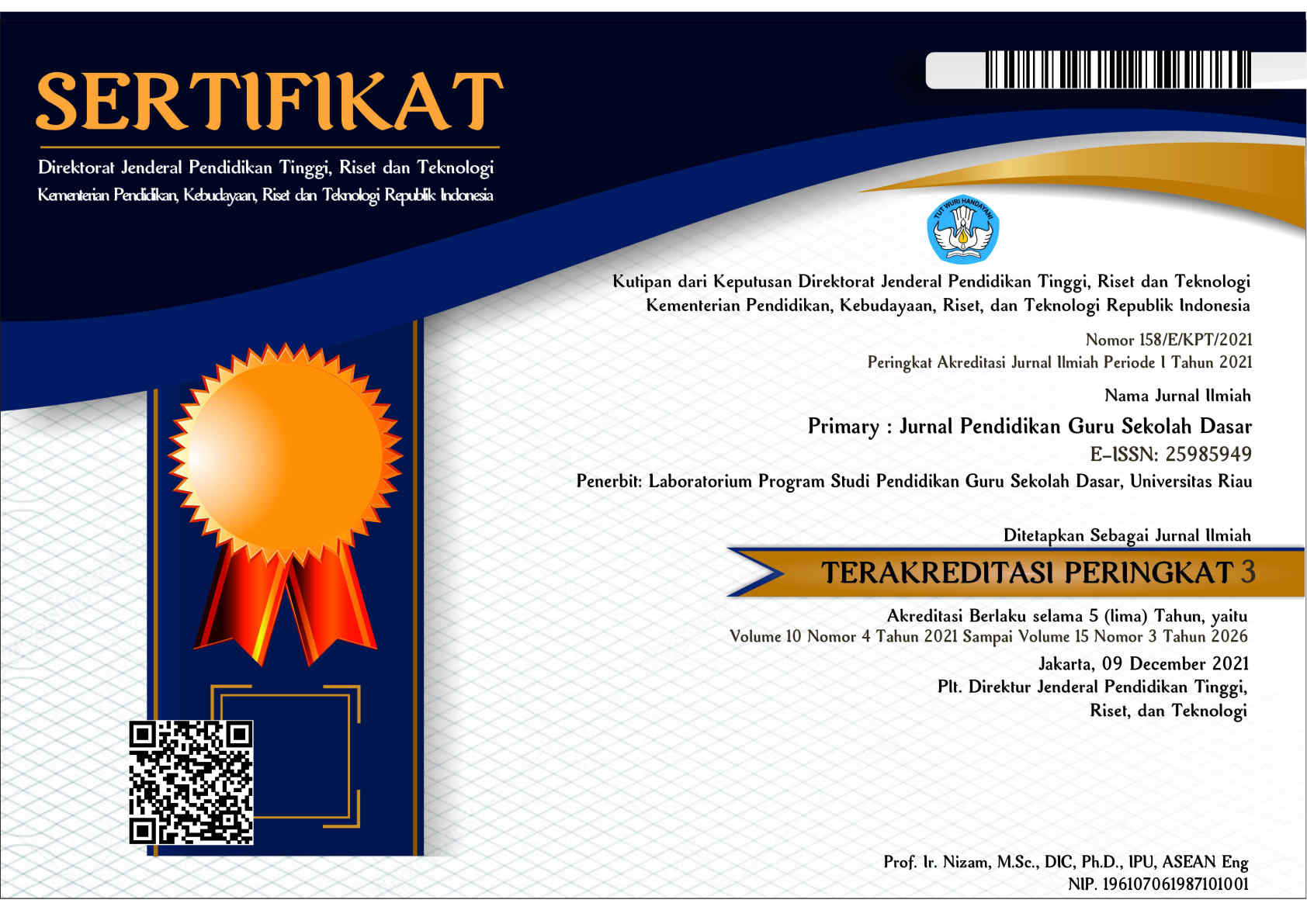PENGARUH PEMBELAJARAN BERBASIS MASALAH TERHADAP PRESTASI BELAJAR IPA SISWA KELAS IV SEKOLAH DASAR
Abstract
This research aimed at investigating the difference in science learning achievement between students studying through problem-based learning and those studying through conventional learning. 10 grade IV elementary school students were selected as research samples and they were divided into two groups: an experimental group and a control group. Those groups had been equalized by conducting Product moment analysis. This study utilized a post-test-only control group design. Learning achievement data were collected by using a multiple-choice test method. The test validity was examined by using Point Biserial while the test reliability was examined by using KR-20. Before testing the hypothesis, the data were processed with prerequisite test namely Normality Test (with a significance = 0.2), Variant Homogeneity Test (with a significance of 0.158), Box'M Test (with a significance = 0.146), and the Correlation Test between Dependent Variables / Multicollinearity (Tolerance and VIF =1). Then, the hypotheses were tested by using MANOVA (Multivariate Analysis of Variance). The research finding showed that: there was a significant difference in science learning achievement between students studying through problem-based learning and those studying through conventional learning (F=5.574 and sig.=0.046; p<0.05).
Keywords
Full Text:
PDF (Bahasa Indonesia)References
Ardeniyansah & Rosnawati, R. (2018). Implementation of Problem-Based Learning in terms of Student Mathematical Creative Thinking. Journal of Physics: Conference Series 1097(1):012111. DOI: 10.1088/1742-6596/1097/1/012111.
Budiningsih, C. A. (2005). Belajar dan pembelajaran. Jakarta: Rineka Cipta.
Candiasa, I Made. 2011. Statistik Multivariat Disertai Aplikasi SPSS. Singaraja: Undiksha Press.
Chambers, D. (2007). How to Succeed with Problem-Based-Learning. Australia: Carlton South.
Delisle, R. (1937). How to Use Problem-Based Learning In The Classroom. United state of America: Association for Supervision and Curriculum Development.
Gagne. R. M. (1990). Buku Petunjuk Kondisi Belajar dan Teori Pembelajaran. (Munadir, Trans). Jakarta: Dirjen Dikti Depdikbud.
Juleha,S., Nugraha, I., & Feranie,S. (2019). The Effect Of Project In Problem-Based Learning On Students’ Scientific And Information Literacy In Learning Human Excretory System. Journal of Science Learning. Diakses dari https://ejournal.upi.edu/index.php/jslearning/article/view/26.
Lasmawan, W. (2010). Menelisik Pendidikan IPS dalam Perspektif Kontekstual-Empiris. Singaraja: Mediakom Indonesia Press Bali.
Marhaeni, A. A. I. N. (2008). “Pembelajaran Berbasis Asesmen Otentik dalam Rangka Implementasi Sekolah Kategori Mandiri (SKM)”. Makalah. Disajikan dalam Pelatihan Peningkatan Kinerja Guru SMA 1 Kediri Tabanan, dalam Rangka Implementasi SKM; tanggal 30 Desember 2008.
Pradnyana, P. B. (2013). Pengaruh Pembelajaran Berbasis Masalah Terhadap Motivasi Belajar dan Prestasi Belajar Matematika Siswa Kelas IV SD. Jurnal Pendidikan Dasar Ganesha. Diakses dari https://www.neliti.com/id/publications/119603/pengaruh-pembelajaran-berbasis-masalah-terhadap-motivasi-belajar-dan-prestasi-be.
Pusparatri, R., & Dewi, K. (2012). Strategi Pembelajaran Berbasis Masalah untuk Meningkatkan Kemampuan Berikir Kritis Siswa. Jurnal Ilmiah Guru “COPE” (2), 26-35.
Riyanto, H. Y. (2010). Paradigma Baru Pembelajaran sebagai Referensi bagi Pendidik dalam Implementasi Pembelajaran yang Efektif dan Berkualitas. Jakarta: Kencana.
Suarni, N. K. & Gading. (2007). Perkembangan Peserta Didik. Fakultas Ilmu Pendidikan, Universitas Pendidikan Ganesha.
Sari, L., Permana, S., & Rahadi, M. (2014). Pembelajarna Berbasis Masalah untuk Meningkatkan Komunikasi Matematika Siswa Sekolah Menengah Pertama. Jurnal Pendidikan Matematika 3 (3), 143-150.
Trianto. (2007). Model-Model Pembelajaran Inovatif Berorientasi Kontruktivistik. Jakarta: Prestasi Pustaka.
Trianto. (2009). Mendesain Model Pembelajaran Inovatif-Progresif, Konsep, Landasan dan Implementasinya pada Kurikulum Tingkat Satuan Pendidikan (KTSP). Jakarta: Kencana Pranada Media Group.
Yuliana, Y., & Firmansah, F. (2018). The Effectiveness Of Problem-Based Learning With Social Media Assistance To Improve Students’ Understanding Toward Statistics. Infinity Journal. Diakses dari http://e-journal.stkipsiliwangi.ac.id/index.php/infinity/article/view/468.
DOI: http://dx.doi.org/10.33578/jpfkip.v10i1.8013
Refbacks
- There are currently no refbacks.
Copyright (c) 2021 Putu Beny Pradnyana, Desak Putu Anom Janawati

This work is licensed under a Creative Commons Attribution-NonCommercial-ShareAlike 4.0 International License.
____________________________________________________________
Primary: Jurnal Pendidikan Guru Sekolah Dasar
Secretariat
Program Studi Pendidikan Guru Sekolah Dasar
Gedung B1, FKIP Universitas Riau
Kampus Bina Widya Km. 12,5 Simpang Baru Panam
Pekanbaru Riau Indonesia 28293
e-mail : primary@ejournal.unri.ac.id



